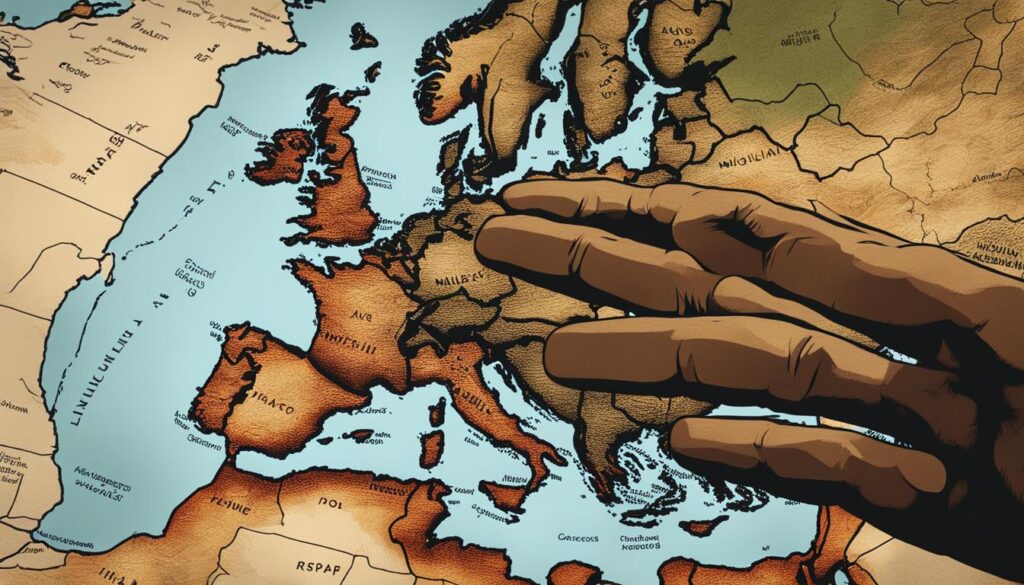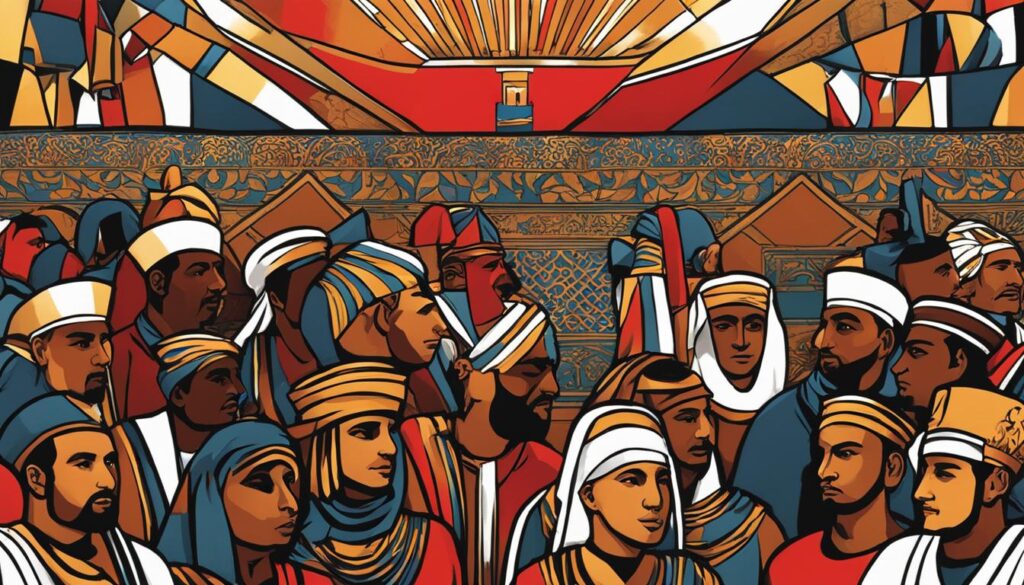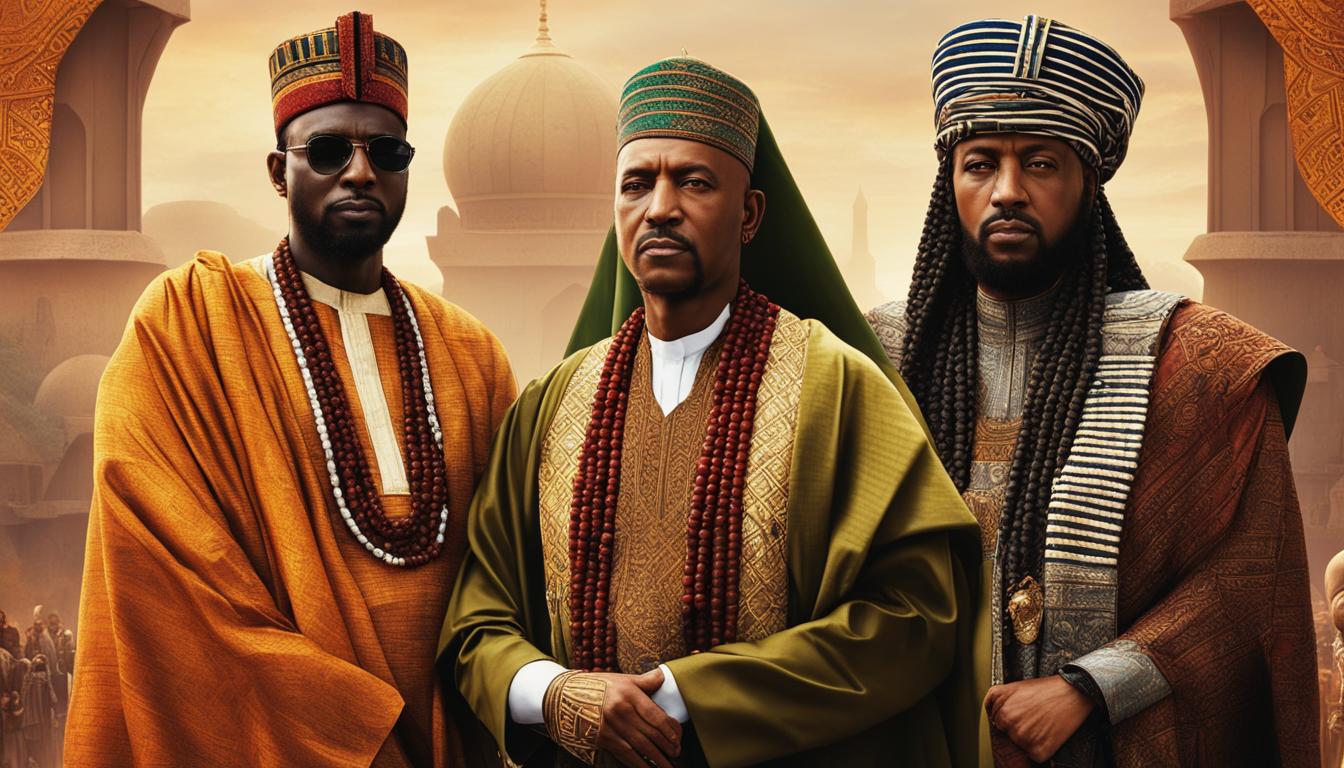The responses of African and Muslim rulers to imperialism were remarkably similar, as both groups faced common challenges and shared similar attitudes towards European domination. As European powers expanded their empires and seized territories, African and Muslim rulers found themselves experiencing a decline in power and struggling to modernize in order to resist the encroachment of the Europeans.
African and Muslim rulers sought to maintain their sovereignty and protect their lands and resources from being taken over. They recognized the need to adapt and modernize their societies in order to effectively resist European domination. Despite their best efforts, both groups faced significant obstacles in achieving these goals.
Parallel to each other, African and Muslim rulers faced the contempt and condescension of the European powers. Their societies were often seen as backward and primitive, and they were subjected to colonization and economic and political domination. The loss of Palestine to the Zionist movement served as a particularly poignant symbol of the humiliation and dispossession experienced by the Muslim world.
Key Takeaways:
- Both African and Muslim rulers faced a decline in power and struggled to modernize in response to European imperialism.
- They sought to protect their sovereignty and preserve their lands and resources from being taken over by European powers.
- African and Muslim rulers experienced the contempt and condescension of the European powers.
- The loss of Palestine to the Zionists became a symbol of the humiliation and dispossession suffered by the Muslim world.
- The impact of European colonization and modernization on African and Muslim societies was profound and shaped their reactions to imperialism.
Ottoman Empire’s Decline and Reforms
The declining Ottoman Empire faced significant challenges in its efforts to adapt to the modern world. Over time, the empire’s power had been diminishing, and it struggled to keep up with the advancements of European nations. Despite attempts at reform, the Ottomans found themselves grappling with internal conflicts and resistance from traditional factions within the empire, leading to the failure of many reform initiatives.
European powers quickly recognized the Ottomans’ weakness and saw an opportunity to seize control of their lands. As the empire’s power declined, nationalist sentiments grew among various ethnic and religious groups within the empire. Corruption and theft further weakened the Ottoman Empire, making it vulnerable to European encroachment.
In an effort to modernize and compete with European powers, the Ottomans embraced various technologies and reforms. Under the reign of Selim III, attempts were made to modernize the military, administrative, and legal systems. The empire also sought to develop its infrastructure and improve education. However, these efforts were often met with resistance from conservative elements and were unable to halt the decline of the empire.
Impact of Reform Attempts
The decline of the Ottoman Empire and the failure of its reform attempts had profound consequences. Not only did it expose the empire’s weakness to European powers, but it also fueled nationalist movements that sought to dismantle the empire from within. The decline of the Ottoman Empire would eventually pave the way for the emergence of modern nation-states in the region.
- The Ottomans’ weakening power allowed European powers to expand their influence in the region, leading to the eventual partitioning of Ottoman territories.
- The failure of reforms highlighted widespread corruption and inefficiency within the empire, diminishing its credibility both domestically and internationally.
- Attempts to modernize and embrace new technologies were unable to address the underlying structural weaknesses and societal divisions present in the empire.
In conclusion, the Ottoman Empire’s decline and reform attempts were marked by internal conflicts, resistance to change, and the encroachment of European powers. Despite efforts to modernize, the empire’s weaknesses were exposed, and its decline played a significant role in shaping the geopolitical landscape of the Middle East.
European Grab for Muslim Lands
The European powers were heavily involved in geopolitics and sought to control strategic locations, particularly in Muslim lands. One of the main attractions for European powers was the Ottoman Empire, which had control over crucial trade routes and access to the Mediterranean and Atlantic sea trade. The Ottomans’ strategic location and control over these routes made them an enticing target for European nations.
Furthermore, the desire for oil played a significant role in European powers’ interest in Muslim lands. As the world began to rely more heavily on oil for industry and transportation, access to oil-rich regions became a top priority. European powers recognized the potential wealth and influence they could gain by taking control of these territories.
The European powers took advantage of the Ottoman Empire’s declining power and military weakness to seize control of Muslim lands. The Russians, in particular, engaged in conflicts like the Crimean War to exploit the Ottomans’ vulnerability. As the Ottomans struggled to modernize and keep up with the advancements of European nations, their lands became easy targets for European colonial ambitions.
Ottomans’ Control of Trade Routes
- The Ottoman Empire’s control over key trade routes made it an attractive target for European powers seeking to expand their influence.
- Trade routes facilitated the movement of goods, resources, and information, giving the Ottomans a significant advantage in the region.
- European powers recognized the strategic importance of these trade routes and sought to gain control over them.
European Powers Attracted to Strategic Location
- The strategic location of Muslim lands, particularly those controlled by the Ottomans, attracted the attention of European powers.
- The Ottomans’ position at the crossroads of Europe, Asia, and Africa made their territories highly valuable.
- European powers saw an opportunity to expand their empires and increase their influence by taking control of these strategic locations.
European Powers Take Lands from Ottomans
- Exploiting the Ottomans’ declining power and military weakness, European powers successfully took control of Muslim lands.
- Conflicts like the Crimean War exposed the Ottomans’ vulnerabilities and provided an opportunity for European powers to expand their territories.
- Through a combination of military conquest and political manipulation, European powers established their dominance over Muslim lands.

The Great Game: British and Russian Rivalry in Central Asia
The rivalry between the British and Russian empires in Central Asia, known as the Great Game, was centered around the struggle for control over Muslim lands. One of the key areas of contention was Afghanistan, which held significant strategic importance for both powers. The British and Russians recognized the value of Afghanistan as a buffer state and a gateway to expanding their influence in the region.
Throughout the 19th century, Afghanistan became a center of struggle between the British and Russian empires. The British initially sought to maintain a weak but friendly Afghan government to serve as a barrier against potential Russian invasion of British India. However, as tensions escalated, the British eventually withdrew from Afghanistan in 1842 after facing a series of military defeats.
The importance of Afghanistan to both the British and Russians cannot be underestimated. For the British, it was seen as crucial in safeguarding their interests in India. The Russian Empire, on the other hand, viewed Afghanistan’s proximity as a strategic opportunity for expanding their influence and gaining access to warm-water ports. The British and Russian rivalry for control over Afghanistan had far-reaching implications and significantly shaped the geopolitical landscape in Central Asia, ultimately influencing the reactions of Muslim rulers to European imperialism.
The Strategic Importance of Afghanistan
- Afghanistan acted as a buffer state between British India and Russian territories, making it strategically significant for both powers.
- The control of Afghanistan provided access to important trade routes and the possibility of expanding influence in the region.
- The mountainous terrain of Afghanistan made it a challenging territory to conquer, adding to its value as a natural barrier.
- The geopolitical significance of Afghanistan extended beyond its borders, impacting the balance of power between European imperialist nations in Central Asia.
Egypt’s Initiatives for Reform
Egypt, witnessing the decline of the Ottoman Empire, took significant initiatives for political and social reforms. Under the leadership of Muhammad Ali, Egypt underwent a period of transformation and modernization. Ali implemented various reforms, including significant military and economic changes, that aimed to modernize Egypt and strengthen its position in the region.
One of the key reforms undertaken by Muhammad Ali was the shift of Egyptian agriculture from traditional crops to cotton production. This move was instrumental in bringing Egypt into the international marketplace and boosting its economy. However, the transition to cotton cultivation had negative consequences for peasants who lost access to their traditional farming lands, leading to social unrest and displacement.
Another significant initiative for reform in Egypt was the construction of the Suez Canal under the rule of Isma’il. The canal, completed in 1869, connected the Mediterranean Sea to the Red Sea, providing a crucial shortcut for international trade and enhancing Egypt’s strategic importance. The construction of the Suez Canal not only modernized Egypt’s infrastructure but also facilitated economic growth and international connectivity.

Modernization Efforts and Their Impact
- Muhammad Ali’s reforms aimed at modernizing Egypt and strengthening its position in the region.
- The shift to cotton production brought Egypt into the international marketplace but had negative consequences for peasants.
- The construction of the Suez Canal enhanced Egypt’s strategic importance, modernized infrastructure, and facilitated economic growth.
Muslim World’s Reaction to Modernization and European Imperialism
The Muslim world found itself in a complex and challenging position in the face of European imperialism and modernization. The dependence on Europe became a defining aspect of Muslim societies, as European powers exerted their influence and imposed colonial rule. This unequal power dynamic gave rise to feelings of resentment and humiliation within the Muslim world.
European colonizers often held a contemptuous attitude towards Muslim societies, viewing them as backwards and primitive. This derogatory perception further fueled the corrosive effect of colonization on Muslim societies, contributing to a sense of rage and hostility towards the West. The loss of Palestine to the Zionist movement, supported by Western powers, served as a symbol of the Muslim world’s humiliation and dispossession.
In response to colonization and modernization, Muslim rulers and intellectuals grappled with how to navigate the new dynamics imposed by the West. Some advocated for embracing Western ideas and technologies, seeing them as a means to regain power and status. Others, however, staunchly rejected Western influence, seeking to preserve their own cultural and religious traditions.
Muslim World’s Dependence on Europe:
- Unequal power dynamic with European colonizers
- Europeans imposed their influence and colonial rule
- Dependence on European powers for economic and political stability
Muslim Society Seen as Backward:
- European powers held a contemptuous attitude towards Muslim societies
- Viewed as backwards and primitive
- Contributed to a sense of resentment and humiliation
Muslim Response to Colonization:
- Rage and hostility towards the West
- Some advocated for embracing Western ideas and technologies
- Others rejected Western influence, seeking to preserve their own traditions
The Muslim world’s reaction to European imperialism and modernization was deeply influenced by a sense of dependence on Europe, the contemptuous attitude of European powers, the view of Muslim society as backward, and the corrosive effects of colonization. This response shaped the attitudes and actions of Muslim rulers as they navigated the complex challenges brought about by Western dominance. Understanding the Muslim world’s historical experiences is crucial to comprehending the contemporary geopolitical landscape and ongoing tensions between the East and West.
Impact of European Colonization on Islamic Countries
The invasion of European powers into the Islamic world had a profound impact, reducing the once vibrant and independent Islamic countries to dependent blocs. The colonization brought about an exposure to the contempt of the colonialists, who held a disdainful attitude towards Muslim societies. This exposure further fueled the resentment and resistance felt by Muslim rulers.
The European colonization can be seen as a modernizing assault on the Islamic countries, as the colonizers sought to impose their own economic and political domination. The Islamic world became subject to economic exploitation and political control, leading to a loss of sovereignty and resources. This imbalance of power created bitter conflicts and rivalries among the Muslim nations, such as the deadly hostility between India and Pakistan.
One of the most significant consequences of European colonization was the loss of Palestine to the Zionist movement, supported by the Western powers. This event symbolized the humiliation and dispossession experienced by the Muslim world. The impact of this loss reverberated throughout the Islamic countries and became a rallying point for resistance against European imperialism.
Impact of European Colonization on Islamic Countries:
- Reduction of Islamic world to dependent bloc
- Exposure to contempt of colonialists
- Economic and political domination
- Bitter conflicts and rivalries
- Deadly hostility between India and Pakistan
- Loss of Palestine
The impact of European colonization on Islamic countries cannot be underestimated. It fundamentally altered the social, political, and economic landscape of these nations. The wounds inflicted during this period of history continue to shape the present-day struggles and aspirations of Muslim rulers as they navigate the complexities of a changing world.
Conclusion
In conclusion, African and Muslim rulers exhibited similar reactions to imperialism, facing common challenges and struggles. Both groups experienced a decline in power and sought to modernize in order to resist European domination. They were determined to protect their sovereignty and preserve their lands and resources from being taken over.
The impact of European colonization and modernization on both African and Muslim societies was significant, shaping their reactions to imperialism. These rulers faced the daunting task of navigating through a changing world and resisting external forces seeking to exploit their lands. Despite the difficulties they encountered, they remained steadfast in their commitment to protecting their sovereignty.
Overall, the similarities in African and Muslim rulers’ reactions to imperialism highlight the shared experiences and challenges faced by these groups. Their struggles to modernize and maintain their independence demonstrate their resilience and determination. By actively preserving their lands and resources, they sought to safeguard their cultural heritage and identity in the face of European domination.
FAQ
How were the reactions of African and Muslim rulers to imperialism similar?
Both African and Muslim rulers faced a decline in power, struggled to modernize, and sought to resist European domination.
What challenges did the Ottoman Empire face during its decline?
The Ottoman Empire struggled to keep up with the advancements of European nations, faced internal conflicts and resistance to reforms, and experienced a decline in power.
Why were European powers attracted to Muslim lands?
European powers were attracted to the strategic location of Muslim lands, particularly those controlled by the Ottoman Empire, which held control over trade routes and access to important sea trade routes.
What was the Great Game and how did it impact Muslim lands?
The Great Game was a rivalry between the British and Russian empires in Central Asia, with Afghanistan becoming a center of struggle. The strategic importance of Afghanistan influenced the actions of both powers.
What initiatives for reform did Egypt take during the decline of the Ottoman Empire?
Egypt implemented political and social reforms under leaders like Muhammad Ali. These reforms included changes in the military and economy, such as shifting towards cotton production and the construction of the Suez Canal.
How did the Muslim world react to modernization and European imperialism?
The Muslim world felt a sense of humiliation and rage, as they were subjected to colonization and viewed as backward by European powers. The loss of Palestine further fueled their resentment and resistance.
What was the impact of European colonization on Islamic countries?
European colonization led to economic and political domination, bitter conflicts and rivalries, and the reduction of the Islamic world to a dependent bloc. The loss of Palestine and exposure to contempt from colonialists contributed to the deep resentment felt by Muslim rulers.
What were the similarities in the reactions of African and Muslim rulers to imperialism?
Both African and Muslim rulers faced common challenges, including a decline in power, the struggle to modernize, and the desire to protect their sovereignty and lands from being taken over by European powers.

